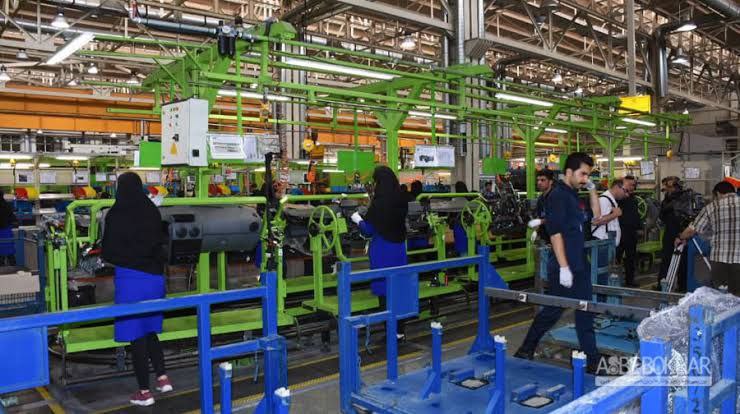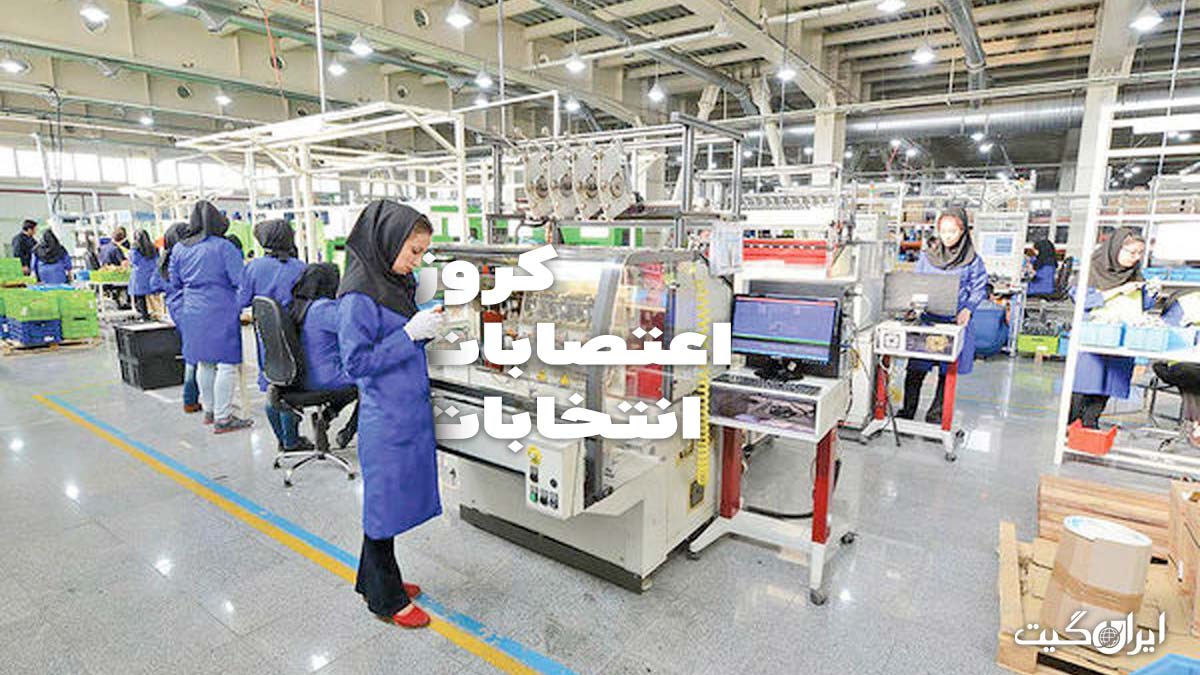Crouse: Strikes and Elections
According to Iran Gate, there were about 300 or 400 of us present at the strike on November 18 in the open area of Crouse Company. The women in navy blue uniforms were shouting, ‘The poverty line is 20 million, the base salary is 6 million.’ Some women wore plastic slippers because they are forced to stand behind the machines for hours, even on holidays, with mandatory shifts.
These are the words of Rash, one of the employees of Crouse Company. Crouse Industrial Manufacturing Company is the largest and main supplier of automotive parts in Iran. Although the company’s website states that ‘we are committed to enhancing the quality of life of our employees, our company’s competitive position, and the technical capability of Iran’s automotive industry,’ over the past years, the workers and employees of this company have been among the protesters against the non-compliance with minimum wage and harsh working conditions.
Low wages and difficult economic conditions persuaded many of the company’s employees to participate in the November strikes, which, according to its employees, led to some being identified by security forces and eventually dismissed.
On November 17 and 19, 2022, amid nationwide protests in Iran, workers at three Crouse sites stopped working. According to the Free Union of Iranian Workers, these workers protested against low wages and the cancellation of Friday overtime shifts. Meanwhile, Crouse Company stated in a declaration that there was no stoppage in Crouse’s production lines and that Crouse personnel would continue production uninterrupted, regardless of political issues.
M.M. works in the lighting hall of Crouse Company. On the first of December, when we wanted to enter the company, we were prevented and told, ‘Your contract has ended.’ There were about 200 of us that day. Morad Beigi was also there, not feeling well. I knew he had family problems. We agreed with the others to come to the company every morning. We gathered at the guard post. The next day I heard Morad Beigi committed suicide in the restroom and was taken to the hospital.
The story of the suicide of a female Crouse employee due to dismissal has appeared in some media, but Crouse Company did not react to it. Previously, subsidiaries of oil, gas, and petrochemical refineries that participated in strikes reported being threatened and intimidated by their managers and announced that a group of protesting workers had been dismissed. However, these days Crouse is more known in the public mind for its 34 trillion toman embezzlement case than for the strikes.
Crouse Company, which describes its strategy on its website as providing high-quality and reliable components and systems to meet the needs of the country’s industries, was tried on January 22, 2022, on charges of criminal activities related to professional and organized smuggling of automotive parts amounting to 34 trillion tomans.

The managers of the company, which was ranked as the 50th company in Iran by the Industrial Management Organization in 2017, are accused of leading and coordinating a criminal group in smuggling, as well as other charges such as bribing customs employees, disrupting the distribution of essential goods through overpricing of auto parts, gaining illicit wealth, and major disruption of the country’s economic system.
According to Crouse Company, there are currently 12,000 active employees working there. In the first trial session of its embezzlement and smuggling case, presided over by Abolghasem Salavati, Crouse managers were accused of bribing billions of tomans.
Case Details
In the filed case, several defendants are named, including Mohammad Ali Pour Fatreti, Hamid Keshavarz Tochaei, and Masoud Ahmadizadeh. The prosecutor’s representative stated that Messrs. Ahmadizadeh and Mohammad Ali Pour Fatreti, who are Iranian-Canadian, are residing outside the country. According to the prosecutor’s representative, bribe amounts were transferred from Masoud Ahmadizadeh’s accounts to Hossein Fereydoun.
According to the report, Masoud Ahmadizadeh, who worked at Bank Saderat, acted as a bribe intermediary and was sentenced to 15 years in prison for this case. The prosecutor’s representative also said that through Masoud Ahmadizadeh, 600 million tomans in two instances, 1.1 billion tomans in one instance, and 100 million tomans in one instance were received for the ninth parliamentary elections, and these amounts were paid by Crouse Company.
Hamid Keshavarz Tochaei
The first defendant in the Crouse case, Hamid Keshavarz Tochaei, son of Hassan, holds dual Iranian-American citizenship. Known as a top entrepreneur and founder of Crouse Parts Manufacturing Company, he owns the Crouse and Bahman groups. In court, when asked by the judge if he had American citizenship, he said no, only Iranian citizenship. He denied all the allegations in court, stating that he rejects all of them.
Keshavarz considered the information in the indictment to be erroneous, stating that no part of our case is unknown.
One of his accusations was buying Iran Khodro shares and interfering in its management. He stated, ‘In 2008, along with my partner Mr. Alipour, we purchased Iran Khodro shares, and by 2011, these shares increased to 14%, leading us to be elected as board members of Iran Khodro. To date, we have been non-executive members of Iran Khodro, and we have no role in managing this company.’
He says that over recent years, many accusations have been made against him regarding managing Iran Khodro, but he has been cleared of these accusations by the Competition Council’s Appeal Board. However, his exoneration has been accompanied by much controversy.
Another accusation against Keshavarz was buying the Bahman automotive group. He explains that in 2016, when the Bahman group was auctioned, he purchased it through a third company and with a third partner. Meanwhile, the Bahman group, with 228,000 shareholders, operates as the only publicly traded automotive group.
Keshavarz claimed that Crouse Company has no connection with Hossein Fereydoun and Masoud Ahmadizadeh. ‘We are wise enough to keep our distance from the country’s political apparatus because politics and economics have many differences.’
Another accusation against Keshavarz was importing Chinese goods and using Crouse Company labels on them. ‘I consider a smuggler to be someone who brings goods into the country by boat without paying any duties or taxes, but we have always imported goods legally.’
He says that Crouse Company was forced to import goods by air and therefore paid 2 million dollars for air freight.
While Hamid Keshavarz Tochaei was recognized as the first defendant in this case, the Director General of Social Security of Alborz Province last year praised him as the top figure in entrepreneurship at the ninth national festival for choosing top entrepreneurship figures of 2021 in this province.
Information obtained shows that Keshavarz not only held American citizenship but also transferred a large amount of currency abroad under the pretext of purchasing real estate in other countries.
This case involves 18 defendants, with the first and second defendants holding Iranian-American and Iranian-Canadian citizenship, one of whom is a fugitive. These two are accused of major involvement in the country’s economic system through leading and organizing a criminal group in professional and organized smuggling of automotive parts amounting to 33 trillion, 961 billion, 686 million, 419 thousand, and 100 tomans between the years 2013 and 2020, facilitated by paying bribes to customs employees.

